Hello, everyone!
Today we have a question that is rather specific about nursing school; it comes from a reader who wanted help assisting her coaching client. I thought it deserved a thorough answer, and I wanted to share my response here because I know it could help some of you out there.

However, I know it’ll be irrelevant for others of you, so I apologize in advance for how niche this post is.
Here’s the question:
I am a life coach with a client who is struggling with nursing school. You are doing a phenomenal job at navigating life challenges and nursing school simultaneously so I instantly thought you would have some words of wisdom in this situation.
Recently reading how you had so many study groups set up for your test instantly gave me the idea to reach out to you on behalf of my client. I think at this point I would like to work with her on some time management, study skills and habits that will help her confidently complete her nursing school. I, too, was a homeschool mom to my three (now adult) sons, so teaching good study habits is not new to me.
However, I have not navigated a fast-paced, rigorous, and intense course load such as this. I was wondering if there are any study aids and methods that have helped you be successful throughout your process that you might feel like sharing.
I love that you are helping your client through the challenges of nursing school; I bet you are a godsend to her. 🙂
Every nursing school is a little bit different so I’m happy to share my best tips for how I have managed my time.
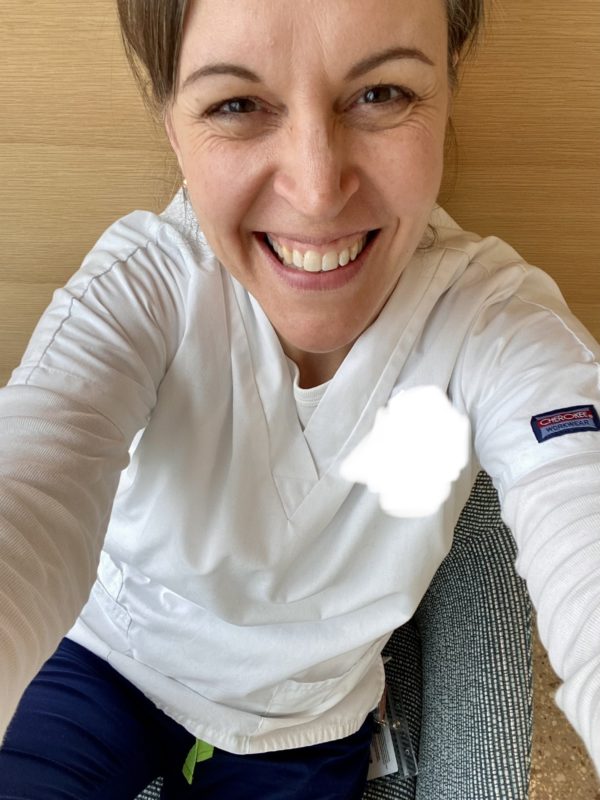
A caveat: I know that people are unique and their learning styles vary. I can only share what has worked for me because that’s all I know!
A second caveat: the program I’m in is an associate degree, with prereqs. So, the tips I’m going to write are largely applicable to nursing-specific and scientific classes. They won’t be as helpful for more general classes like Women’s Health.
1. Have a “but why?” approach rather than memorizing
I attribute a lot of my success in nursing school to this approach. Starting from when I took my prereqs (Bio 101, Microbio, Anatomy and Physiology, etc.) I have really tried to understand the why of everything I was learning.
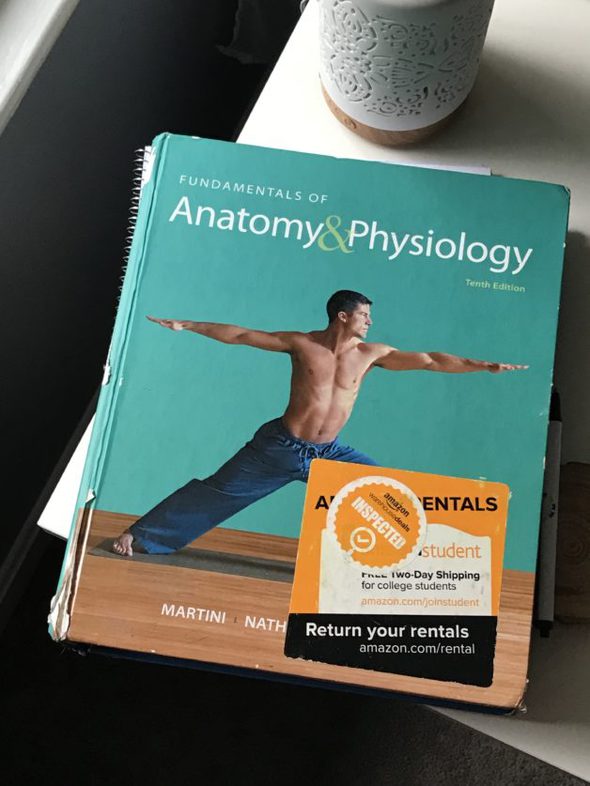
Why does an antibiotic not work on a virus?
(Most antibiotics work by interfering with the cell wall; viruses don’t have cell walls. Ergo, an antibiotic is useless against a virus.)
Why does an enteric-coated tablet not harm the stomach?
(The coating is dissolvable only at a basic ph, so it passes through the acidic stomach unscathed until it reaches the basic environment of the post-stomach digestive tract!)
Why does left-sided heart failure cause shortness of breath?
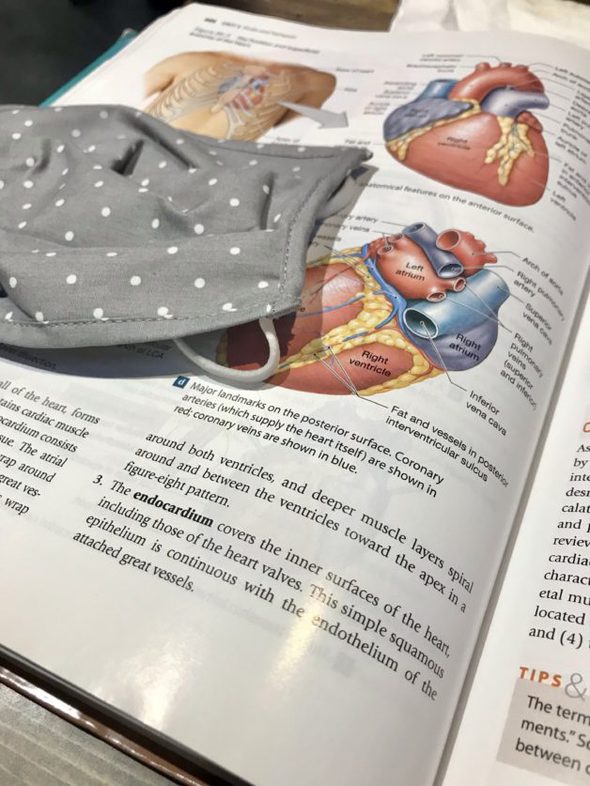
(Because if that side doesn’t pump well, the blood goes backward to the lungs, causing a fluid overload, and lungs can’t work well when they’re drowning in fluid.)
If you can really understand how the human body works, then you can think through exam questions so much better without needing to resort to rote memorization.
2. There are some things you need to memorize
I know, I kinda contradicted myself. There’s a place for both things, though! Understand whatever you can, but also know you’re gonna have to memorize some things.
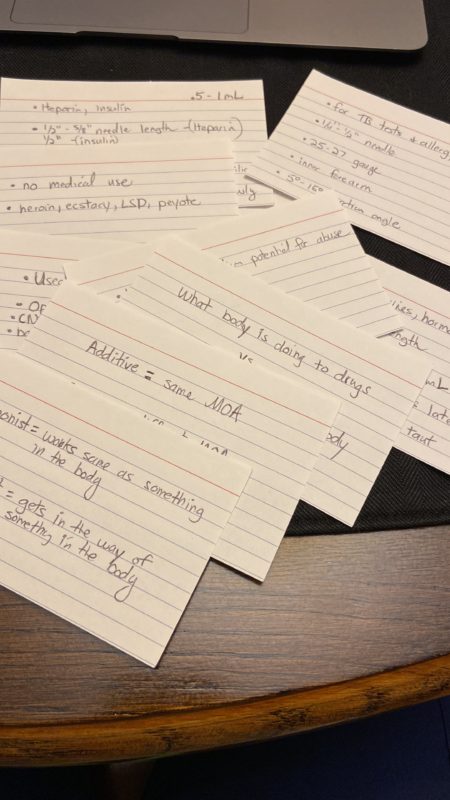
Lab value ranges, side effects, drug classes…there’s some stuff you just have to commit to memory.
Use flashcards. Make Quizlets. Make Kahoots. Tape things up on your wall. Drill with fellow students.
When I’ve had memorization-heavy units, I’ve made Quizlets and then I like to play the Quizlet matching game. It’s good for getting fast at recall, and you can easily do it on your phone while you eat breakfast. 🙂
3. Do not, do not, DO NOT wait until the last minute
Nursing school goes at a tremendous pace, and there’s a lot of heavy content on almost every exam. I don’t think you can survive by cramming.

Get the assignments started early, do the pre-lecture work early, and perhaps most importantly…..
4. Start studying for the next exam as soon as the last one is done
I start working on the next module’s worth of material pretty much as soon as I get home from an exam.
This gives the information lots of time to marinate in my brain before the next exam rolls around, and it also means I am not panicking right before the exam.
5. Try explaining concepts at a grade-school level
If you can simplify a concept so that a grade-schooler (or a non-medical person) would understand it, you will know you have a good grasp of it. Get together with a friend and teach each other. If you can teach it, you know it.
(Some of those answers that I gave at the beginning of this post are an example of what that can look like.)
Bonus: You’re gonna have to teach your patients, so it’s good practice to be able to simplify concepts!

heading to a clinical shift
For instance, when I have a patient who needs to wear sequential compression devices on their legs, I say something like,
“Human bodies don’t have a dedicated pump to push blood back up to your heart. Normally, when you walk around, your muscles squeeze the veins to move blood back to your heart, but since you’re lying in bed, the blood has a hard time moving.
So, we’re gonna put these on your legs to do the squeezing for you. That way the blood won’t stay in your legs where it could form a clot.”
6. Pair a body task with a head task
This is one of my best keys!
When I am doing something that requires bodily effort but not much focused brain effort, I almost always listen to a lecture, podcast, or YouTube video on my current nursing topics.
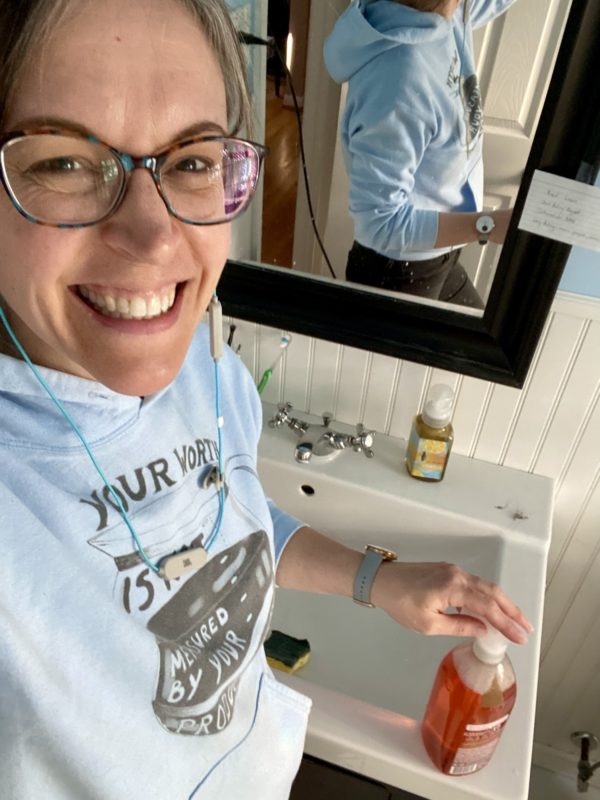
Lectures + bathroom cleaning (also, see the notecards on my mirror!)
For me, this includes activities like:
- going for a walk
- driving
- cooking
- folding laundry
- misc. household chores
- brushing teeth/washing face/putting on makeup/doing my hair
There’s also a way to listen to an audio version of my textbook chapters.
And I listen to almost everything on 1.5x-2x speed. Maximum efficiency.
My mind would drift if I tried to just sit down and listen to a nursing podcast; I pay way better attention to audio learning if my body is busy.
7. Look up some extra resources
The nursing program provides lectures and textbooks and such, but I always supplement with stuff I find on my own.
For instance, when I figure out the current topics, I go to my podcast app and search a disease/med with “nursing” added on the end. Like….”acute kidney failure nursing” or “ventricular fibrillation nursing” and then I download some podcasts on the topics.
That way I always have a bunch in my library.
I like to add “nursing” on because podcasts aimed at med students aren’t as helpful. We are trying to learn nursing interventions and those are different than what a doctor would need to know.

Straight A Nursing is one of the best nursing podcasts I’ve come across; I definitely recommend her as a resource! She also has quite a few podcasts on nursing school survival and time management.
I also use YouTube with the same process.
- Osmosis videos
- Nurse Mike of Simple Nursing
- Sarah from Registered Nurse RN
- Nexus Nursing (great for NCLEX question practice)
- Cathy from LevelUp RN
8. Try a small study group
Large study groups devolve into socializing very easily; I think a group of 2-3 is perfect. Find one or two friends and meet up at school in an empty room.
You can teach each other, brain dump onto a white board, quiz each other, and talk through concepts.
9. Try concept maps/active recall
Skimming through a PowerPoint presentation to review is not actually super helpful; it’s better to try writing down what you know about a topic and then you can look back at the PowerPoint to fill in the gaps.
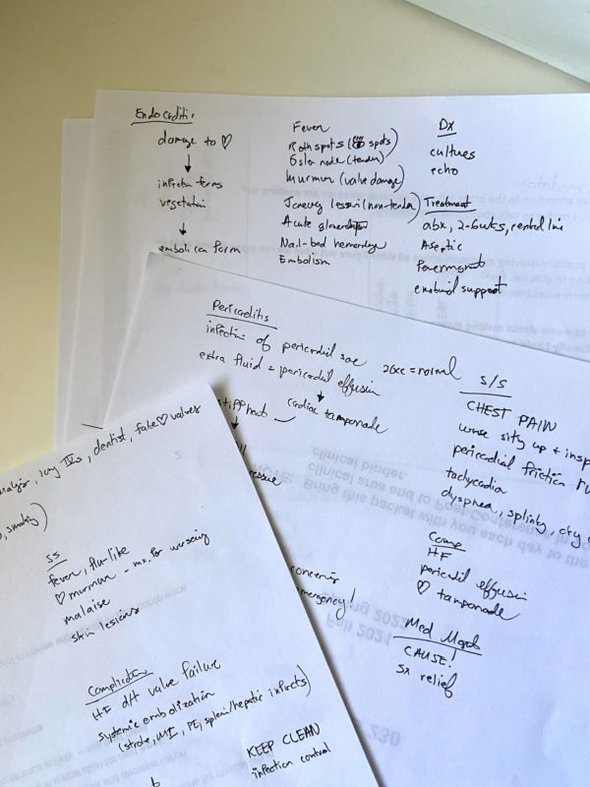
This really shows you where your weak spots are!
Keep doing fresh concept maps as you study, and you’ll have fewer and fewer gaps each time.
10. Find a schedule management style that works for you
At my school, no two weeks are ever the same, which means I can never get into a routine. I live week by week!
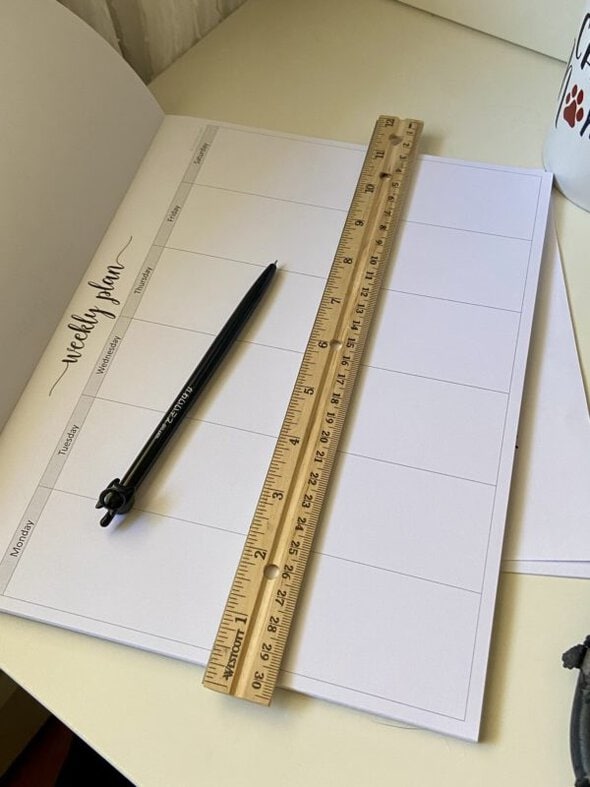
Usually I sit down on Fridays and map out the upcoming week or two so that I know when I have lectures, labs, simulations, clinical, exams, and so on.
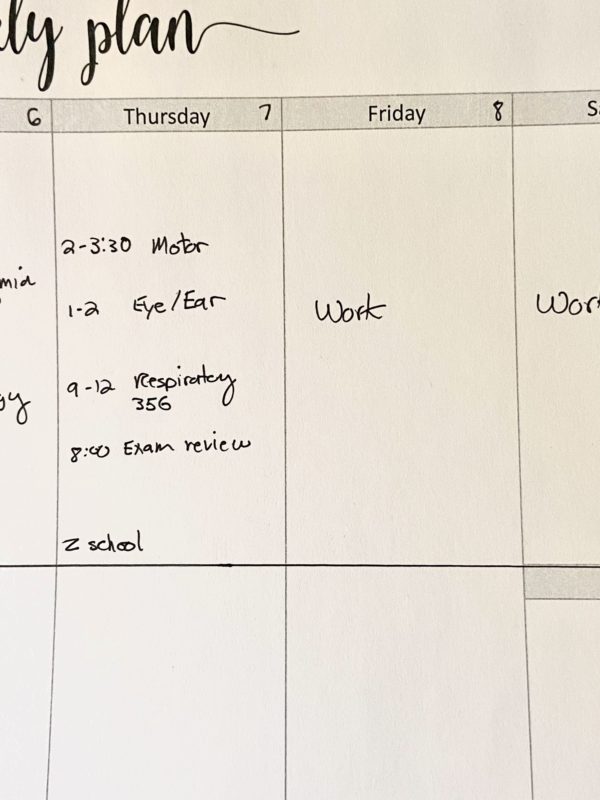
when I work a paid shift at the hospital, that’s all I write on the page because I do pretty much nothing else on those days except eat and sleep. Ha.
For me, it works to do it on a paper planner, but the important thing is to use a method that works with your own brain!
11. Take good care of your body
This is not a study tip specifically, but I still think it’s an important way to round out the list. A body that feels good will help you withstand the high stress of a nursing program!
And nursing school IS stressful: studies show that nursing students tend to experience higher stress than non-nursing students (See this NIH article which references this Science Direct article.)

Three things that I think are important:
- Put yourself to bed on time
- Move your body
- Feed yourself with foods that make your body feel good
These things are not a waste of time; they are an investment that pays dividends. All of your school efforts will bear more fruit if your body and brain are rested, exercised, and fed. 🙂
_____________________
I’m sure I could think of more advice, but this post is long enough already.
Readers, do you have advice to add to mine?
(and it’s ok if you haven’t done nursing school; any advice about how to thrive in a fast-paced college program is welcome!)

Kira
Thursday 10th of April 2025
Thank you! This is GOLD. I am a new 53 year old nursing student starting an Accelerated BSN and these tips are super motivating & helpful. I have been following along and I am so proud of you that you are almost done!!!
BikeMom
Thursday 10th of April 2025
I thought of one, and it’s something I’ve seen you do: figure out which balls are plastic, and which are glass.
If you’re trying to keep a lot of balls in the air, it’s worth taking a moment to figure out which ones you can drop & pick back up, and which will just shatter.
That might refer to classes (which classes could you not do as well on, if you need to focus attention on another class, or a home issue) or home life (if you live with other people, could one of them pick up something like cleaning or making meals, or could you outsource something like grocery shopping).
BikeMom
Thursday 10th of April 2025
This is awesome! I’m in the “about to start” phase, and really appreciate the tips!
Becky
Tuesday 8th of April 2025
Great info Kristen! Much appreciated.
Katja
Monday 7th of April 2025
Contradicting Kristen (all great tips, applicable on other studies too) a bit, but for those who get easily distracted: design a dedicated working space. This can even be a part of the kitchen table that is empty and quiet. Empty is important here. Then sit there at the designated time until it is really over and only effeciently spent. Your body and mind will tune in and it will get easier to concentrate and not get distracted. This is a problem I had in my younger years, so not knowing how old the client is, it might help. Breaking up bigger projects and documenting the progress helps too. Use glasses of marbles where you transfer the done into the next jar, you get the idea - anything that you can and will see.